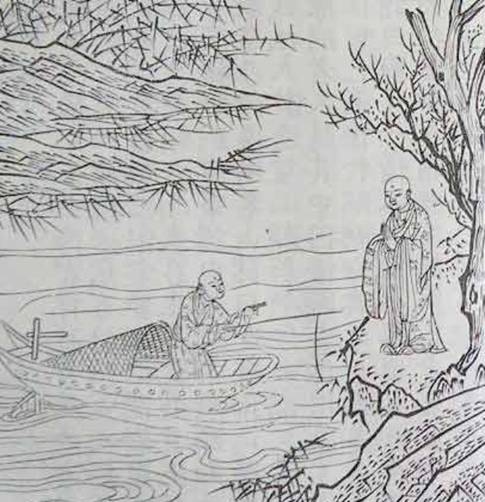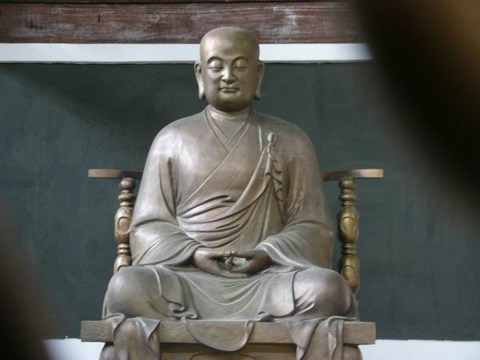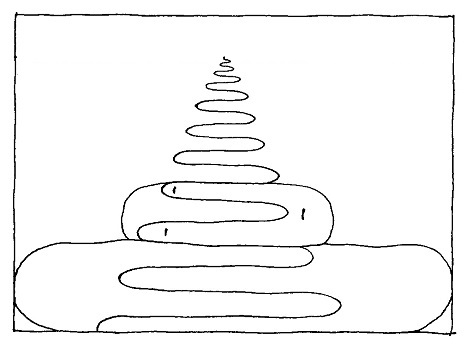ZEN MESTEREK ZEN MASTERS
« Zen főoldal
« vissza a Terebess Online nyitólapjára


夾山善會 Jiashan Shanhui (805-881)
(Rōmaji:) Kassan Zenne
(Magyar átírás:) Csia-san San-huj
Tartalom |
Contents |
| Csia-san San-huj Fordította: Terebess Gábor |
Jiashan Shanhui |
![]()
Jiashan Shanhui [Kassan Zen`e] 夾山善會 (805–881) was born in Xianting 峴亭 in Guangzhou 廣州; his surname was Liao 廖. While still a child he became a monk on Mount Longya 龍牙, in modern Hunan. Later he went to Jiangling 江陵 in modern Hubei, took the precepts, and became a lecture master 座主. One night when Shanhui was lecturing in Jingkou 京口, where he had subsequently gone to live, a monk asked, “What is the dharmakāya?” Shanhui answered, “The dharmakāya is without form.” “What is the dharma eye?” the monk then asked. Shanhui said, “The dharma eye is flawless. Before the eyes there are no dharmas. Though the meaning exists before the eyes, it cannot be reached by the eyes or ears.” At this point the visiting monk laughed. When Shanhui asked why he had laughed, the monk, Daowu Yuanzhi 道吾圓智 (769–835), suggested that he go to Huating 華亭 to see Chuanzi Decheng 船子德誠 (n.d.), a monk who was at that time working as a ferr yman. Decheng, Daowu said, “hasn't a tile to cover his head above, nor a gimlet point of earth to stand on below.” Shanhui went straightaway to Huating and found Decheng in his boat on the river. In the subsequent encounter Shanhui thoroughly penetrated Decheng's dharma. Decheng told him to avoid crowded cities, live in the mountains, and concentrate on finding a successor to keep the dharma alive. He then tipped over his boat and was never seen again. Shanhui lived in seclusion for over thirty years. In 870 he and the assembly that had gathered around him built a monastery, Lingquan yuan 靈泉 院, on Mount Jia 夾山.
Note in The Record of Linji
by Ruth Fuller Sasaki
JIASHAN SHANHUI
by Andy Ferguson
In: Zen's Chinese Heritage: The Masters and Their Teachings, Wisdom Publications, pp. 207-209.
JIASHAN SHANHUI (805–81) was a disciple of Chuanzi Decheng (the Boat Monk). After taking the monk’s vows at age twenty, he proceeded to study the sutras. He later met Zen master Daowu Yuanzhi, who recommended that he go see Chuanzi Decheng. Although Jiashan’s understanding of Buddhism was already extensive, he did not attain complete awakening until his meeting with Decheng in the famous incident at Huating. Thereafter, he was recognized as Chuanzi Decheng’s Dharma heir. Jiashan Shanhui was the first Zen master known to closely link Zen with drinking tea. He described their intimacy as “Zen, tea, one taste.”
Zen master Jiashan Shanhui was from Guangzhou. His surname was Liao. He left home at a young age and was ordained as a priest. He studied the sutras and commentaries, and thoroughly practiced the three great studies [that is, the precepts, meditation, and wisdom]. Later, when he went out into the world [to preach], he lived at Helin in Run Province. At the urging of Daowu he went to see the Boat Monk, Chuanzi Decheng, from whom he completely received the teaching, without the slightest gap. Honoring his teacher’s instructions, he forsook the world and lived in seclusion in the mountains. Large numbers of students came to study with him and their thatched huts were scattered [unorganized]. From morning until night they studied with the master. In the year 870 the assembly moved to Mt. Jia, where they built a temple.
One day, Jiashan entered the hall and addressed the monks, saying, “Since the times of the ancestors there have been those who misunderstand what has been passed down. Right up to now they have used the words of the buddhas and ancestors and made them models for study. If people do this then they’ll go crazy and have no wisdom at all. The buddhas and ancestors have instructed you that the dharmaless root is the Way. The Way is without even a single Dharma. There is no buddha that you can become. There is no way that can be attained. Nor is there any Dharma that can be grasped or let go of. Therefore the ancients said, ‘Before the eyes there is no Dharma, but the meaning is before the eyes.’ Those who want to study the buddhas and ancestors haven’t opened their eyes. Why do they want to submit to something else and not attain their own freedom? Basically it’s because they are confused about life and death. They realize they don’t have a bit of freedom, so they go thousands of miles to seek out some great teacher. Those people must attain the true eye, not spend their time grasping and discarding spurious views. But are there any here among you of definite attainment who can really hold forth about existence and nonexistence? If there’s someone who’s definite about this then I invite you to speak out.
“When persons of high ability hear these words they are clear about what’s being said. Those of middle or low ability continue rushing around. Why don’t you just directly face life and death? Don’t tell me you still want the buddhas and ancestors to live and die in your place! People who understand will laugh at you.
“If you still don’t get it, then listen to this verse:
Belaboring life and death,
Just seeking Buddha’s quarter,
Confused about the truth before your eyes,
Poking a fire to find a cool spot.”
A monk asked, “There has always been meaning attributed to the teachings of the buddhas and ancestors. Why does the master say there isn’t any?”
Jiashan said, “Don’t eat for three years and you won’t see anyone hungry.”
The monk said, “If no one is hungry, why can’t I gain awakening?”
Jiashan said, “Because awakening has confused you.”
Jiashan then recited this verse to make his point:
Clear and luminous, no Dharma of awakening,
Awakening confuses people.
In paradise with two feet and eyes,
Nothing false, and nothing true.
Jiashan entered the hall and addressed the monks, saying, “I’ve been living on this mountain for twenty years, and the whole time I’ve never spoken a word about the essential teaching of Zen.”
A monk asked, “Is the master saying that you’ve been here for twenty years and you’ve never spoken about the central matter of Zen?”
Jiashan said, “Yes.”
One of the monks then overturned the meditation platform.
Jiashan stopped speaking and went out.
The next day, all the monks were called to assemble. The master dug a hole and had his assistant call out the monk who had overturned the platform the day before.
Addressing the monk, Jiashan said, “For twenty years I’ve been speaking meaninglessly. So today I invite you to kill me and bury me in this hole. Do it! Do it! If you can’t kill me then kill yourself and bury yourself in this hole!”
The monk went to the monks’ hall and packed his bag. He then quietly stole away.
On the seventh day of the eleventh month in [the year 881], Jiashan called together his principal monks and said, “I’ve talked extensively for many years. As to the Buddhadharma, each of you should know for yourself. Now I’m just an empty form. My time is up and I must go. Take care of the teaching as if I were still here. Don’t be like people of the world and be grief stricken after I’m gone.”
Upon saying these words, Jiashan suddenly passed away. His remains were kept in a stupa built on the mountain. He received the posthumous name “Great Teacher Transmitting Clarity.”
Csia-san San-huj
Fordította: Terebess Gábor
Folyik a híd, Officina Nova, Budapest, 1990, 84. oldal
Csia-san elmélkedésbe merülten ült. Tung-san mester éppen arra járt:
– Hogy megy? – kérdezte.
– Hát így – felelte Csia-san.

Réber László rajza